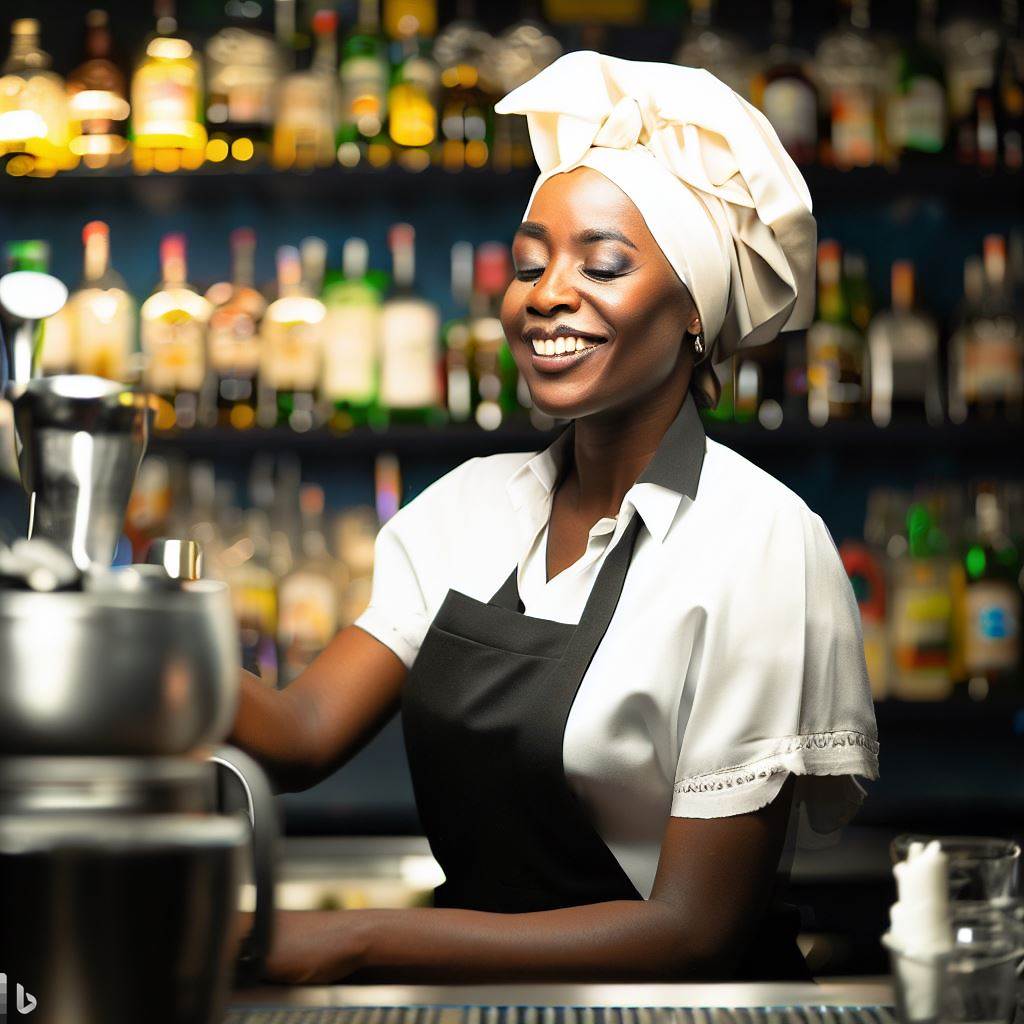Introduction
Bartending in Nigeria comes with legal requirements that aspiring bartenders and bar owners must understand.
These requirements not only ensure compliance with the law but also contribute to the smooth running of establishments.
In this blog post, we will provide an overview of the legal requirements for bartending in Nigeria.
Understanding these requirements is crucial for aspiring bartenders or bar owners as they play a significant role in the successful operation of their businesses.
By complying with these regulations, they can avoid legal issues and create a safe and enjoyable environment for their patrons.
Overview of the outline to follow
The outline of this blog post will cover the following key areas:
- Licensing: We will delve into the various licenses and permits required to legally operate a bar in Nigeria. This will include the process, documents, and costs associated with obtaining these licenses.
- Age Restrictions: We will highlight the legal drinking age in Nigeria and its implications for bartenders and bar owners in terms of serving alcoholic beverages to customers.
- Responsible Service: This section will discuss the legal obligations of bartenders and bar owners in ensuring responsible alcohol service, such as not serving minors or intoxicated individuals.
- Health and Safety Regulations: We will explore the necessary measures that bartenders and bar owners must take to maintain a hygienic and safe working environment, including training on food handling and fire safety.
By understanding and adhering to these legal requirements, aspiring bartenders and bar owners can enhance their professionalism, protect their businesses, and contribute to the growth of the Nigerian bartending industry.
Minimum Age Requirement
When it comes to bartending in Nigeria, there is a legal age requirement that must be followed.
This requirement applies to both bartenders and customers, and violating it can lead to potential consequences.
Here is a breakdown of the minimum age requirement for bartending in Nigeria:
- Legal Age for Bartending: In Nigeria, the legal age for bartending is 18 years old.
- Applicability: This age requirement applies to both bartenders and customers. Bartenders must be at least 18 years old to serve alcohol, while customers must be at least 18 years old to consume alcohol at a bar or nightclub.
- Consequences of Violation: Violating the minimum age requirement for bartending can have serious consequences for both bartenders and bar owners.
Potential consequences for violating this requirement
Here are some potential consequences:
- Legal Penalties: A bartender or bar owner who violates the minimum age requirement can face legal penalties, including fines and possible imprisonment. This is in line with the National Minimum Drinking Age Act.
- Licensing Issues: Bartenders who are underage may not be able to obtain the necessary licenses and permits required to work in the industry. This can limit their job opportunities and professional growth.
- Loss of Reputation: Bar owners who allow underage bartenders to work can suffer damage to their reputation. It reflects poorly on the establishment and can lead to a loss of trust from the community and potential customers.
- Safety Concerns: Allowing underage individuals to work as bartenders or consume alcohol can pose safety risks. Younger individuals may be more prone to accidents or irresponsible behavior, potentially leading to harm to themselves or others.
It is essential for bartenders, bar owners, and customers to adhere to the legal age requirement in Nigeria.
By doing so, they can ensure compliance with the law and promote responsible drinking habits.
Overall, the minimum age requirement for bartending in Nigeria is 18 years old.
This requirement applies to both bartenders and customers, and violating it can result in legal penalties, licensing issues, reputation loss, and safety concerns.
It is crucial for all parties involved to understand and abide by this requirement to maintain a safe and responsible bartending environment in Nigeria.
Training and Certification
A. Need for Bartenders to Undergo Training and Obtain Certification
- Bartenders must undergo training to gain essential skills and knowledge required for their profession.
- Certification ensures bartenders meet legal requirements and industry standards in Nigeria.
- Training and certification enhance professionalism and promote responsible serving of alcohol.
B. Recognized Training Programs and Institutions in Nigeria
- Several training programs and institutions offer bartending courses in Nigeria.
- The Nigerian Institute of Bartenders offers comprehensive training programs for aspiring bartenders.
- Other institutions include Mixology Academy Nigeria and Bar Academy Nigeria.
C. Process of Acquiring Certification and Its Validity Period
- After completing a bartending training program, individuals can apply for certification.
- Requirements for certification may vary but commonly include age restrictions, educational background, and practical experience.
- Applicants must submit necessary documents and pass an examination to obtain certification.
- Valid certification typically lasts for a specific period, usually one to three years.
D. Benefits of Being a Certified Bartender
- Certification enhances job prospects and provides a competitive edge in the job market.
- Certified bartenders are trusted by employers and customers due to their proven skills and knowledge.
- Being certified demonstrates a commitment to professionalism, responsible service, and adherence to legal requirements.
- Certification also opens doors to additional career opportunities, such as working in high-end establishments or becoming a bar manager.
Licensing and Permits
In order to legally serve alcohol as a bartender in Nigeria, there are several licenses and permits that are necessary to obtain.
These licenses and permits are issued by relevant government agencies and failure to obtain them can result in penalties.
A. Necessary Licenses and Permits
- The Business License: Bartenders must first obtain a business license from the Corporate Affairs Commission (CAC). This license allows them to legally operate a business in Nigeria.
- The Alcohol License: Bartenders also need to obtain an alcohol license from the National Agency for Food and Drug Administration and Control (NAFDAC). This license specifically permits them to serve and sell alcohol.
- The Health and Safety Permit: Bartenders must ensure that they have a health and safety permit from the State Health Ministry. This permit ensures that they maintain proper hygiene and sanitation standards.
- The Fire Safety Certification: To ensure the safety of both employees and customers, bartenders must obtain a fire safety certification from the Federal Fire Service in Nigeria.
- The Permit for Live Entertainment: If bartenders plan to host live entertainment events at their establishment, they must obtain a permit from the Nigerian Copyright Commission (NCC).
B. Relevant Government Agencies
- Corporate Affairs Commission (CAC): This agency is responsible for issuing the business license and ensuring the registration of the bartending business.
- National Agency for Food and Drug Administration and Control (NAFDAC): NAFDAC is responsible for issuing the alcohol license and regulating the sale and consumption of alcoholic beverages.
- State Health Ministry: The State Health Ministry issues the health and safety permit and ensures that bartenders comply with health and sanitation standards.
- Federal Fire Service: The Federal Fire Service provides the fire safety certification and ensures that bartenders have taken necessary precautions to prevent fire hazards.
- Nigerian Copyright Commission (NCC): The NCC issues the permit for live entertainment to bartenders who wish to host events with live music or performances.
C. Application Process and Requirements:
To obtain the necessary licenses and permits, bartenders must follow a specific application process and meet certain requirements:
- File the necessary application form from the relevant government agencies.
- Provide proof of identification, such as a valid national identification card or passport.
- Submit a detailed business plan, including information on the establishment, a menu, and the target market.
- Undertake a background check to ensure the applicant has no criminal record.
- Attend and pass any required training courses or workshops.
D. Penalties for Operating without Licenses
Operating a bartending business without the necessary licenses and permits can result in severe penalties, including:
- Fines imposed by the government agencies responsible for issuing the licenses and permits.
- Temporary closure of the establishment until the required licenses and permits are obtained.
- Loss of reputation and credibility within the industry.
- Potential criminal charges and legal consequences.
In fact, bartenders in Nigeria must ensure they obtain the necessary licenses and permits from the relevant government agencies to comply with legal requirements.
Failure to do so can result in penalties that may jeopardize their business and reputation.
Read: Earnings Insight: Bartender Salaries in Nigeria

Alcohol Sales and Consumption Regulations
- Alcohol sales and consumption in Nigeria are regulated by specific legal requirements.
- Bars and clubs must adhere to restrictions regarding their hours of operation.
- Selling alcohol to minors and intoxicated individuals is strictly prohibited by law.
- Violating these regulations can lead to severe legal consequences for both individuals and establishments.
Alcohol sales and consumption in Nigeria are subject to strict legal regulations.
It is important for bartenders and those working in the hospitality industry to be aware of these requirements to ensure compliance and avoid legal repercussions.
A. Restrictions on Hours of Operation
Bars and clubs in Nigeria have specific restrictions on their hours of operation.
These restrictions are in place to regulate the sale and consumption of alcohol and maintain public order.
It is important for bartenders to be aware of the designated operating hours to avoid operating outside the legal framework.
B. Prohibition of Selling Alcohol to Minors
One of the key legal requirements regarding alcohol sales is the prohibition of selling alcohol to minors.
It is illegal to sell alcoholic beverages to individuals under the legal drinking age, which is typically 18 years old in Nigeria.
Bartenders must verify the age of customers before serving them alcohol to comply with this regulation.
C. Prohibition of Selling Alcohol to Intoxicated Individuals
Bartenders must also adhere to the law that prohibits selling alcohol to intoxicated individuals.
It is the responsibility of bartenders to monitor the behavior and level of intoxication of customers.
Selling alcohol to already intoxicated patrons not only violates the law but also puts their well-being at risk.
It is crucial for bartenders to be aware of the signs of intoxication and refuse service accordingly.
D. Legal Consequences for Violating Regulations
Violating alcohol sales and consumption regulations in Nigeria can have severe legal consequences.
Both bartenders and bar owners can face penalties, including fines, suspension of operating licenses, and even imprisonment.
These consequences highlight the importance of understanding and adhering to the legal requirements surrounding alcohol sales in Nigeria.
In short, bartenders in Nigeria must familiarize themselves with the legal requirements for alcohol sales and consumption.
They should be aware of the restrictions on operating hours, the prohibition of selling alcohol to minors and intoxicated individuals, and the potential legal consequences for violating these regulations.
By complying with these laws, bartenders can contribute to the responsible and safe consumption of alcohol in Nigeria.
Read: The Art of Mixology: Bartending Trends in Nigeria
Health and Safety Regulations
As a bartender in Nigeria, it is crucial to understand and adhere to the health and safety standards set by the law.
These regulations are in place to protect both the bartenders and customers, ensuring a safe environment.
Below are the key points to consider:
A. Adhering to Health and Safety Standards
- Bartenders and bar owners must strictly adhere to the health and safety standards prescribed by the government.
- Regular inspections are carried out to ensure compliance with these standards.
- Implementing proper ventilation systems to maintain air quality is essential.
- Fire safety measures are necessary, including smoke detectors, fire extinguishers, and escape routes.
- Providing first aid kits and training staff on emergency response procedures is vital.
B. Maintaining a Clean and Hygienic Bar Area
- A clean and hygienic bar area is crucial to prevent the spread of diseases and ensure customer satisfaction.
- All bartenders should practice good personal hygiene, including regular handwashing and wearing clean uniforms.
- Cleaning and sanitizing bar utensils, glassware, and surfaces regularly is necessary.
- Proper waste management and disposal, including separate bins for recyclables and general waste, should be implemented.
- Regular pest control measures should be in place to prevent infestations.
C. Handling and Storage of Alcohol
- Bartenders should receive proper training on responsible alcohol service and handling.
- Ensuring the correct temperature for storing alcohol is maintained to prevent spoilage.
- Proper labeling and dating of alcohol bottles is essential for inventory control and quality assessment.
- Storing alcohol away from other potentially hazardous substances is necessary.
- Adhering to legal regulations regarding the hours of alcohol service is important to avoid penalties.
D. Penalties for Non-Compliance with Health and Safety Regulations
- Failure to comply with health and safety regulations can result in severe penalties.
- These penalties can include fines, suspension of licenses, or even closure of the establishment.
- Reputation damage and loss of customers can occur if health and safety standards are not maintained.
- Repeat offenses can lead to more significant consequences, including legal actions and imprisonment.
- Therefore, it is crucial for bartenders and bar owners to prioritize health and safety guidelines to ensure the smooth operation of their establishments.
Following the health and safety regulations not only helps in avoiding penalties but also creates a positive image in the industry.
Customers will feel more confident in visiting a bar where their well-being is prioritized.
Moreover, maintaining a clean and hygienic environment will contribute to the overall success and sustainability of the business.
Therefore, bartenders and bar owners should always stay informed about the latest health and safety regulations and make necessary adjustments to comply with them.
Read: How to Become a Certified Bartender in Nigeria
Responsible Alcohol Service
As a bartender in Nigeria, it is essential to understand the legal obligations when it comes to responsible alcohol service.
Failure to comply with these obligations can result in severe consequences.
Here are some key points to consider:
A. Legal Obligations
- Bartenders have a legal responsibility to serve alcohol responsibly and within the confines of the law.
- It is crucial to be aware of the legal drinking age and to request identification from customers to verify their age.
- Understanding and complying with licensing laws and regulations regarding the sale and service of alcohol is essential.
- Ensuring that alcoholic beverages are served in appropriate and standardized measures, such as using a measuring device.
- Being knowledgeable about the specific rules and regulations of the establishment in which you work.
B. Duty of Care
Bartenders also have a duty of care towards their customers, which means they are responsible for ensuring their safety and well-being while consuming alcohol.
This duty includes:
- Monitoring customers’ alcohol consumption and identifying signs of intoxication.
- Intervening when necessary to prevent customers from becoming overly intoxicated or engaging in potentially harmful behavior.
- Providing alternative non-alcoholic beverages to customers upon request or when they appear intoxicated.
- Offering assistance or arranging transportation for customers who are in no condition to drive.
C. Recognizing and Dealing with Intoxicated Individuals:
Being able to identify signs of intoxication and managing intoxicated individuals is crucial to maintain a safe and responsible drinking environment.
Techniques for dealing with intoxicated individuals include:
- Monitoring customers’ behavior, such as slurred speech, unsteady movements, or impaired judgment.
- Being attentive to customers who show signs of intoxication and promptly limiting or refusing their alcohol consumption.
- Remaining calm and non-confrontational when dealing with intoxicated individuals.
- Offering water, food, or non-alcoholic beverages to help sober customers up.
- Engaging the assistance of security personnel if needed to manage intoxicated or unruly customers.
D. Potential Legal Consequences
Failure to adhere to the legal and responsible service of alcohol can have severe legal consequences.
Some potential consequences include:
- License suspension or revocation, resulting in the closure of the establishment.
- Civil liability for accidents or injuries caused by an intoxicated individual who was overserved.
- Criminal charges and legal penalties for overserving alcohol or serving minors.
- Damage to the establishment’s reputation, leading to loss of customers and revenue.
- Personal legal liability for bartenders who knowingly violate alcohol service laws.
It is crucial for bartenders in Nigeria to take their legal obligations seriously and prioritize responsible alcohol service.
By doing so, they can protect themselves, their customers, and their establishment from potential legal issues and contribute to a safer drinking culture.
Read: Top Bartending Schools in Nigeria: A Complete Guide
Conclusion
Understanding and adhering to legal requirements for bartending in Nigeria is crucial.
It ensures the smooth operation of bars, protects customers, and prevents legal issues for both bartenders and bar owners.
Aspiring bartenders and bar owners should take the time to familiarize themselves with the relevant regulations.
This includes obtaining the necessary licenses, ensuring responsible alcohol service, and staying updated on any changes in the law.
By complying with the legal requirements, bartenders and bar owners can create a safer and more enjoyable environment for their customers.
They also avoid facing penalties, fines, or even the closure of their establishments.
To guarantee compliance and responsible alcohol service in Nigeria, it is essential for all individuals involved in the bartending industry to remain informed and educated.
Continuous training and professional development help maintain high standards and promote responsible drinking.
Ultimately, the success of bartending in Nigeria relies on understanding and following legal requirements.
By doing so, aspiring bartenders and bar owners contribute to a thriving industry that prioritizes the safety and satisfaction of its customers.




